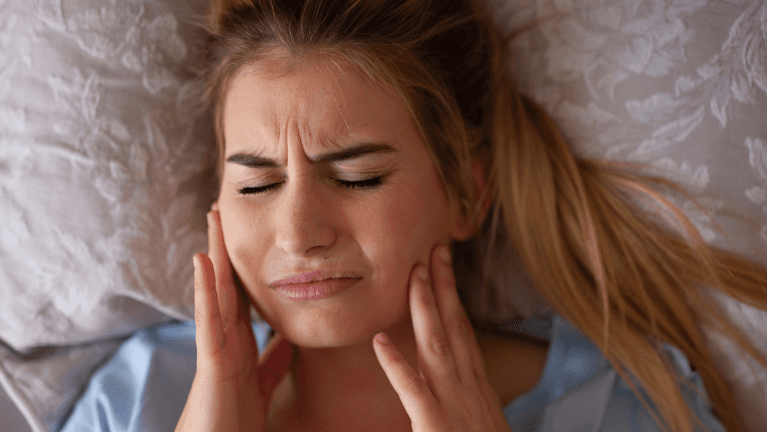
Have you ever woken up with a sore jaw or a headache? Or maybe you've been told that you make a grinding noise while you sleep. These could be signs of bruxism, a common condition often overlooked yet crucial to oral health. In this article, our Tarzana TMJ and Bruxism dentist discuss bruxism, understanding its types, causes, and, most importantly, ways to treat, manage, and protect your teeth.
What is Bruxism?
Bruxism is a medical condition characterized by grinding, gnashing, or teeth clenching. More than just a habit, this behavior can occur either during the day (awake bruxism) or at night (sleep bruxism) and can significantly impact your oral health. Awake bruxism is often a daytime response to stress, anxiety, or deep concentration. Patients might find themselves clenching their jaw during a stressful workday or grinding their teeth while focusing on a task. In contrast, Sleep Bruxism is a nocturnal phenomenon, usually associated with other sleep disorders like sleep apnea. It's often more challenging to diagnose, as patients are unaware of their grinding during sleep, and a partner or family member usually notices it first.
What Causes Bruxism?
Several factors can cause this often-overlooked dental condition:
- Stress and Anxiety
- Sleep Disorders
- Lifestyle Factors
- Medications
- Dental Misalignment
Identifying the root cause of bruxism is key to effective treatment. While stress and anxiety are significant contributors, physiological factors like an abnormal bite or misaligned teeth can also play a role. Lifestyle habits, such as caffeine intake, alcohol consumption, and smoking, might worsen bruxism. Additionally, some medications, especially psychiatric medications, can be potential contributors. Genetics also play a role, as bruxism tends to run in families. Our dentist in Tarzana will discuss these various aspects of dental health with you during your appointment.
What Symptoms Should I Look For?
These symptoms you've been ignoring might be something more:
- Grinding sounds while asleep, often noticed by a partner.
- Jaw soreness or tightness, particularly in the mornings.
- Increased tooth sensitivity or pain.
- Flattened, fractured, or chipped teeth.
- Headaches, especially after waking up.
Recognizing the symptoms of bruxism is the first step toward diagnosis. Common signs include jaw soreness, frequent headaches, especially in the morning, increased tooth sensitivity, and noticeable tooth wear. During a dental exam, there are telltale signs like flattened tooth surfaces, fractured dental fillings, and damage to the inside of the cheek. In some cases, especially when Sleep Bruxism is suspected, you could benefit from a sleep study to monitor jaw muscle activity.
What Happens if Bruxism Isn't Treated?
The long-term effects of bruxism on oral health can be significant. Chronic teeth grinding can lead to tooth enamel erosion and chipped and broken teeth, making you more susceptible to cavities and decay. It can also cause or exacerbate pain and dysfunction in the jaw joint. In severe cases, bruxism can even alter the appearance of one's face, as chronic muscle use can change the shape of the jawline.
What Treatment Options Are Available?
Treatment for bruxism is multifaceted. Dental interventions often include using mouthguards to protect the teeth from grinding damage. Corrective dental work might be necessary for those with misaligned, cracked, or chipped teeth. Stress management techniques, cognitive behavioral therapy, and relaxation exercises can be beneficial for stress-induced bruxism.
Can I Prevent Bruxism?
Preventing bruxism, particularly when it's stress-related, involves lifestyle modifications. Stress management techniques like meditation, regular exercise, and sufficient sleep are crucial. Avoiding substances like caffeine and alcohol, especially before bedtime, can help reduce the likelihood of teeth grinding at night. It's also important to be mindful of daytime jaw clenching and to practice jaw-relaxing exercises.
What Can I Do To Help My Bruxism?
There are several treatments available:
- Dental Correction
- Medication Adjustments
- Stress Management
- Mouthguards
Managing bruxism is a daily commitment. It involves adhering to the treatment plan, using your mouthguard (if prescribed), being mindful of jaw movements, and attending regular dental check-ups. Patients should also be aware of the signs of worsening bruxism, like increased jaw pain or tooth sensitivity, and seek timely dental advice and intervention.
Have There Been Any Advances in Treating Bruxism?
The field of dental research is constantly evolving, bringing new insights into managing bruxism. Recent studies have focused on the link between stress, sleep disorders, and bruxism, leading to more holistic treatment approaches. Advances in dental technology, like more comfortable and effective mouthguards, also contribute to better management of this condition.
Understanding bruxism is the first step towards protecting oral health from these silent but potentially harmful effects. If you suspect you might be experiencing bruxism symptoms, seeking professional advice is crucial. Dr. Nargiz Zadeh, DMD, is dedicated to providing comprehensive dental care and guidance on managing conditions like bruxism. Don't let teeth grinding go unnoticed and untreated. Schedule an appointment with us today for a thorough examination and personalized care plan that will keep your teeth healthy and bright.